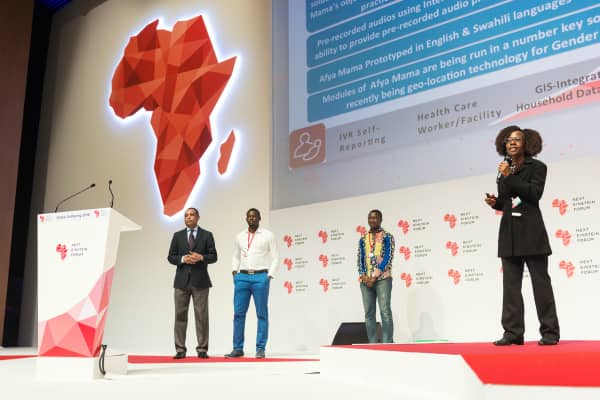The Next Einstein Forum (NEF) has revealed the 16 African finalists shortlisted for the second edition of the Challenge of Innovation to Innovation (Ci2i). A competition that connects science, the society, and policy makers across African and the world in general with the aim of coming with solutions facing human development.
The Ci2i competition was launched back in 2013 and is the product of a partnership between the African Institute for Mathematical Sciences (AIMS) and the Robert Bosch Stiftung.
This year’s competition kicked off yesterday (March 26th) at the Global Gathering happening in Rwanda’s capital Kigali. The six African finalists shortlisted will go head-to-head for the top prize under three categories:
Data Science and Deep Tech Innovations
Personalized Health Innovations
Climate Smart Innovations
The finalist will pitch their ideas/products/business models before a panel of judges who will select the final two to compete for another elimination round happening on March 28th. The overall winner will be announced at a live event during the closing of the ceremony. Each winner under the three categories will walk away with $25,000 in prize money.
The following are the finalist under each category
| Climate Smart Innovation | |
| Donatus Njoroge | A Kenyan-based startups whose product – Molepse Bio resource oil/powder – works as a repellent and is very toxic to all pests that invade farmers’ produce after harvesting. |
| Dickson Ayuka | Another startup from Kenya, UjuziKilimo Solution, that provides data to farmers |
| Isaac Brenya | A Ghana-based startup Ecovon, is set to disrupt the building industry by coming with innovative technology for innovative building materials |
| Rachel Sibande | The Malawian startup is using maize cobs to create biofuel to run gasifier-based electrical systems. |
| Isaac Sesi | A Ghanaian startup Sesi Technologies is in the business of developing hardware and software tech for the agricultural sector |
| Dr Lahbib Latrach | The startup from Morocco has come up with an innovative and low cost way of efficiently treating wastewater. |
| Deep Tech Solutions | |
| Abdoulaye Diallo | From Guinea, whose MIMsOmic, a software-as-a-service (SaaS) platform users artificial intelligence, natural language, and bioinformatics domain-specific workflows that is used to help performance of self-service genomic research and biovigilance |
| Davy Uwizera | A Rwanda-based startup S-Transport, an alternative solution to public transport for African cities that uses artificial intelligence |
| Oday Samad | From South Africa, Samad has come up with a technologically-advanced life jacket |
| Tobi Dwoeye | The Nigerian is carrying out research using data generated by patients to establish the effects of pain killer medication |
| Magondu Wairimu | From Kenya, Wairimu is the project manager of eLimu and they are also the brains behind the literacy app Hadithi. |
| Personal Health Category | |
| Conrad Tankou | The Cameroonian founded the social venture GIC Space |
| Joesl Gasana | The Rwandese developed the Companionapp connecting HIV+ with doctors |
| Emmauel Owoebu | The co-founder Mobicure, an e-health startup in Nigeria |
| Muranyandzi Rushambwa | The Zimbabwean designed a system that allows doctors get real-time their patients’ physiological information remotely |
| Daniel Nyabdza | The Zimbabwean’s company Digitech has developed a smart cane for the visually impaired |
Theirry Zomahoun, the founder and chair of NEF said, “At the NEF we believe that inventions, especially science-driven ones that can be scaled up, are critical to Africa’s transformation. The NEF Ci2i challenge rewards research based innovation and products that have a direct impact on our communities.
The selected finalist’s innovation address climate change, various health challenges and push the envelope by proposing new data science or advanced technologies. We look forward to seeing all their ideas come to life.”



